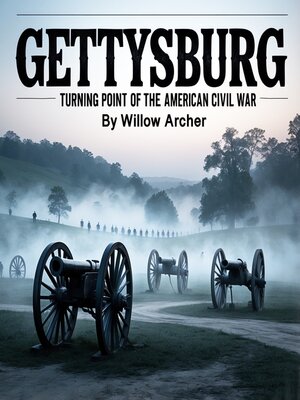
Sign up to save your library
With an OverDrive account, you can save your favorite libraries for at-a-glance information about availability. Find out more about OverDrive accounts.
Find this title in Libby, the library reading app by OverDrive.



Search for a digital library with this title
Title found at these libraries:
| Library Name | Distance |
|---|---|
| Loading... |
This audiobook is narrated by a digital voice.
In the summer of 1863, the small town of Gettysburg, Pennsylvania, lay peacefully in the rolling hills of Adams County, its ten roads radiating outward like spokes from a wheel toward distant destinations across the American landscape. Founded in the 1780s by Samuel Gettys, the town had grown to roughly 2,400 inhabitants who made their living from farming, trade, and the modest commerce that flowed along those same roads that would soon channel the largest armies ever assembled on the North American continent toward their fateful collision.
The strategic importance of Gettysburg lay not in any grand military design but in the simple geography that made it a natural hub for transportation and communication across south-central Pennsylvania. The town sat at the intersection of the Chambersburg Pike, the York Pike, the Baltimore Pike, and seven other roads that connected it to major population centers throughout the region. This network of highways, originally carved by necessity and commerce, would prove to be the magnetic force that drew both Union and Confederate armies inexorably toward a confrontation that neither side had originally planned.
By July 1863, the American Civil War had raged for over two years, transforming from what many had expected to be a brief conflict into a grinding war of attrition that consumed resources and lives at an unprecedented rate. The Confederate States of America, under the leadership of President Jefferson Davis, had demonstrated remarkable resilience in defending their territory against Union forces that possessed overwhelming advantages in population, industrial capacity, and material resources. Yet the Confederacy's ability to continue the war depended increasingly on achieving a decisive military victory that might convince European powers to recognize Southern independence or persuade Northern voters to abandon their support for continued conflict.







